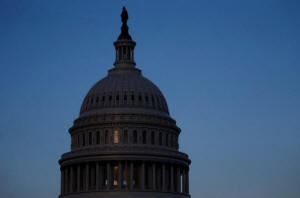|
Trump proposes $15 billion spending cuts,
targets children's health program
 Send a link to a friend
Send a link to a friend
 [May 08, 2018]
By Richard Cowan and Jeff Mason [May 08, 2018]
By Richard Cowan and Jeff Mason
WASHINGTON (Reuters) - U.S. President
Donald Trump will request a package of $15 billion in spending cuts from
Congress on Tuesday, including some $7 billion from the Children's
Health Insurance Program championed by Democrats, senior administration
officials said on Monday.
The proposal comes as the White House and conservative Republicans in
the U.S. Congress were edging away from a threat to pick a new budget
fight with Democrats after Republicans initially floated some $60
billion in cuts a few weeks ago.
Senior administration officials said the initial package of proposed
cuts was targeted at federal funds that were sitting unspent. It would
not affect a two-year budget deal agreed in February.
More "rescission" packages, including a "large" one that would address
cuts Trump wants from that deal, would be forthcoming, one senior
administration official said.

The proposed cut to the CHIP program drew a rebuke from U.S. Senate
Democratic leader Chuck Schumer.
"It appears that sabotaging our health care system to the detriment of
middle-class families wasn’t enough for President Trump and Republicans;
now they’re going after health care dollars that millions of children
rely on, especially during outbreaks of the flu and other deadly
illnesses," he said in a statement after an initial report about the
CHIP proposal.
The senior administration official, speaking to reporters on a
conference call, said the cuts would not hurt the program. Of the total
amount, $5 billion came from an account from which the money is not
authorized to be spent under the law, he said.
The administration is also proposing $4.3 billion in cuts from an
advanced technology vehicle loan program, which the official said had
not made a loan since 2011.
The pullback from a larger figure comes after Republican Party elders,
including Senate Majority Leader Mitch McConnell, warned against cuts
that would unravel the two-year budget deal enacted with the help of
Democrats in February.
The senior official said the package was never intended to be $60
billion.
Even the reduced cuts could antagonize Democrats, whose votes will be
needed in months ahead to help pass bills to keep the government running
in the fiscal year starting on Oct. 1.

[to top of second column]
|

The U.S. Capitol building is seen in Washington, U.S., February 8,
2018. REUTERS/ Leah Millis

The conservative group Americans for Prosperity, backed by the
billionaire industrialist Koch Brothers, floated spending cut proposals
on Monday totaling about $45 billion. Most reductions were aimed at
non-defense spending, including nearly $1.5 billion in child nutrition
programs, $700 million in student grants and $2.2 billion in
international disaster aid. Such spending programs are typically
defended by Democrats.
INFIGHTING
Washington was consumed for much of 2017 by fiscal infighting that
pitted conservative Republicans against moderates in their own party
and Democrats, with the federal deficit and national debt soaring in
the background.
Congressional elections also loom in November, as Republicans battle
to maintain control of both the House of Representatives and Senate.
Democrats in the House and Senate were withholding judgment on
Trump's scaled-back cuts, pending more details.
Some lawmakers worried that some of the targeted unspent money was
still needed, such as funds earmarked for fortifying U.S. coastlines
against hurricanes. That money was enacted after Hurricane Sandy in
2012.
In an op-ed published by the Washington Examiner newspaper, House
Republican leader Kevin McCarthy wrote of "giving the bloated
federal budget a much-needed spring cleaning."

McCarthy is hoping to replace House Speaker Paul Ryan next year. To
do that, McCarthy would need the support of conservative House
Republicans, who spoke last month of taking an "aggressive" approach
to budget rescissions.
That has rankled Democrats. They noted that they opposed tax cuts
Republicans enacted in December that have ballooned federal budget
deficits in recent months and were projected to add at least $1.9
trillion to the $21 trillion national debt.
Massive increases in defense and non-defense spending agreed to in
March by both parties will add $1.3 trillion more to the debt.
(Reporting by Richard Cowan; Additional reporting by Roberta
Rampton; Editing by Kevin Drawbaugh and Peter Cooney)
[© 2018 Thomson Reuters. All rights
reserved.]
Copyright 2018 Reuters. All rights reserved. This material may not be published,
broadcast, rewritten or redistributed.
Thompson Reuters is solely responsible for this content. |